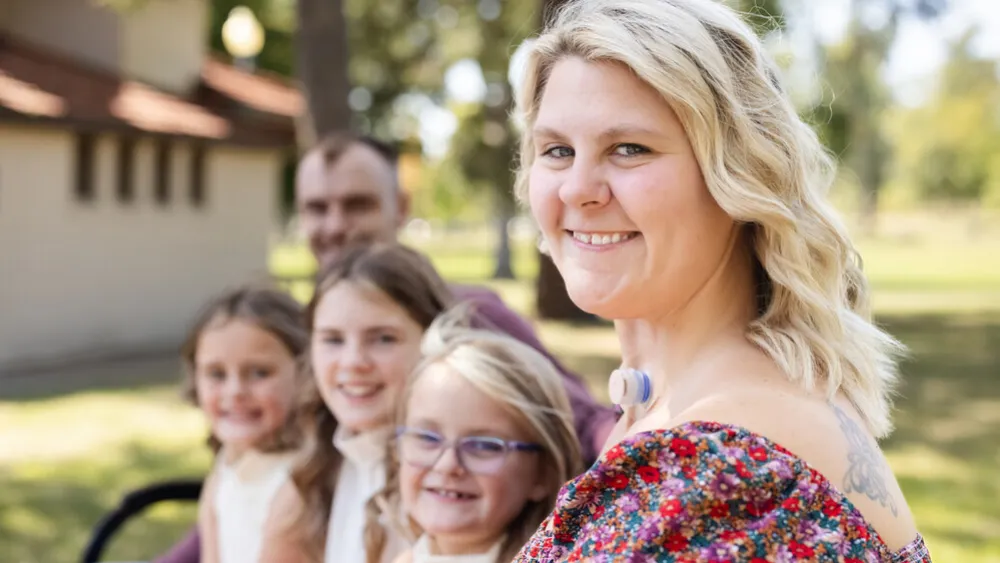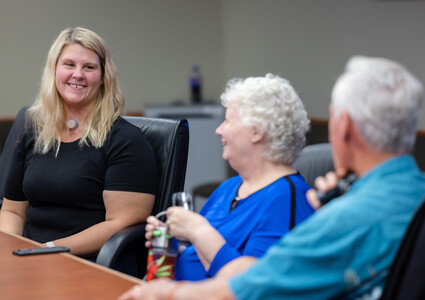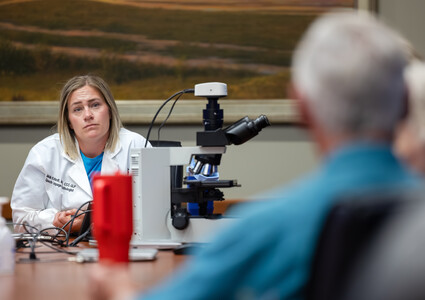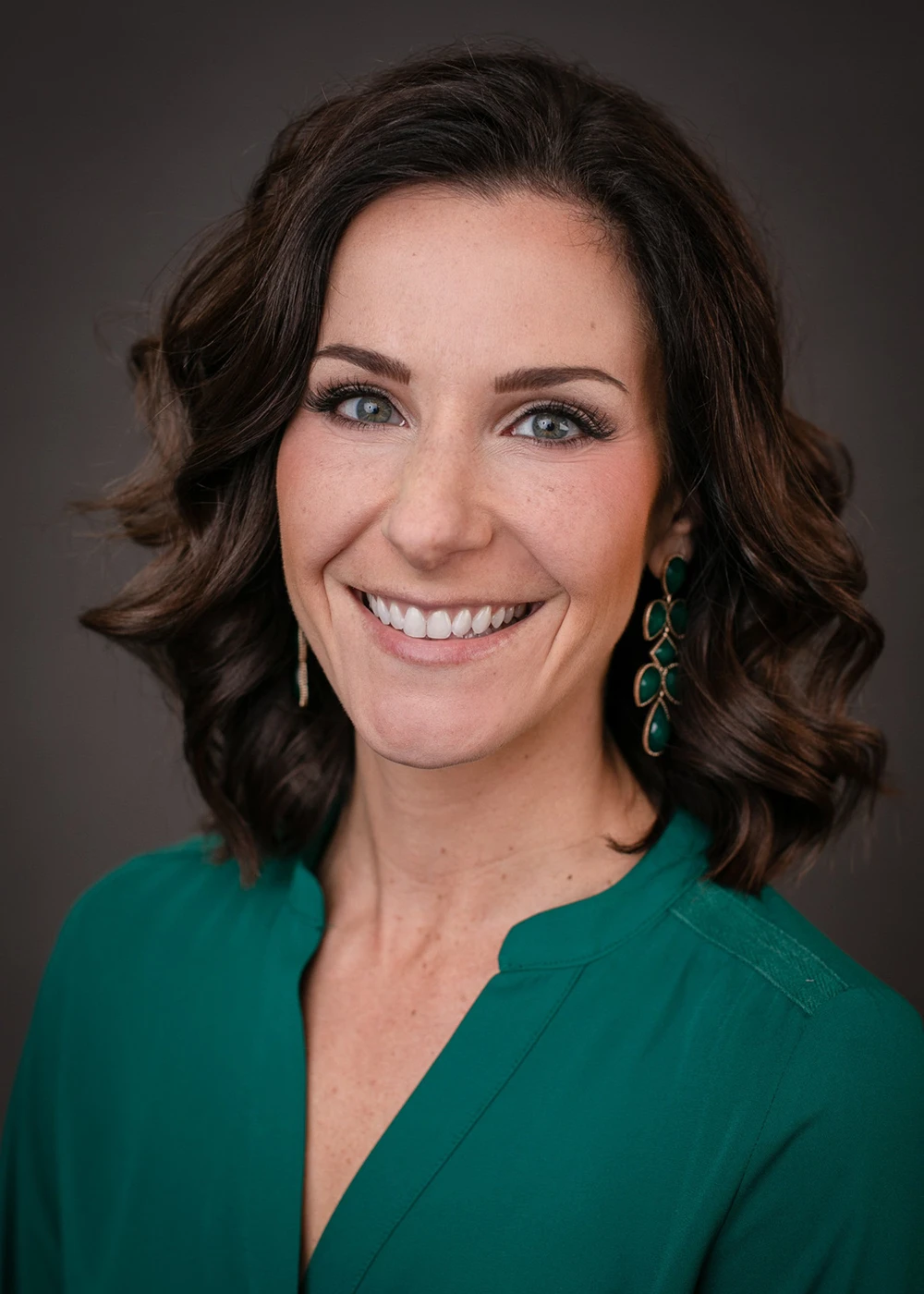
Cancer Care
Life after a laryngectomy: How one survivor is helping others regain their voices and the will to live
Published: Oct. 24, 2024

Tarah Huberty, 32, remembers waking up from surgery in September 2015 and seeing her mom and fiance in tears.
“They gave me a board to write on,” Huberty said. “So, I wrote, ‘Why are you crying?’”
Her family knew she didn’t want this – a total laryngectomy, or the removal of her voice box. It was her biggest fear as she went under for stage 3 adenoid cystic carcinoma – or salivary gland cancer. But right then and there, Huberty, a 23-year-old mother of one at the time, made peace with her reality and resolved to find her voice again – for her daughter, her soon-to-be husband and countless others.
Huberty raised the board and wrote a stout message to her family: “I’m alive. I’m still here. So, stop crying.”
And they did.
Overcoming more than cancer
Less than a month after Huberty’s procedure, she taught herself sign language. Surprising family and friends at her October wedding, she signed her vows, which marked the first of many accomplishments in the face of cancer.

In 2016, during her second pregnancy – this time with twin girls – Huberty taught herself esophageal speech, a technique in which air is swallowed and forced out to produce sound.
“It’s extremely difficult,” said Methodist head and neck surgical oncologist Robert Lindau, MD. “And she has mastered it. I have maybe three other patients who do it. She’s the only one that you can understand 99% of what she says.”
In hopes of avoiding a C-section, Huberty was determined to deliver the twins vaginally, knowing the concept of bearing down would be beyond challenging
as a neck breather.
“There was just no way, I thought,” Dr. Lindau said. “I thought for sure she would end up needing a C-section. She did not.”
In 2018, after her first of four cancer recurrences, Huberty embarked on an overall wellness journey, dropping 170 pounds in the process.
“Simply put, I was overweight,” Huberty said. “And it dawned on me. It was like, ‘I’m not letting cancer kill me, so why am I letting obesity kill me?’”
And she later retaught herself esophageal speech in 2022 following throat reconstruction for her second recurrence.
“When I was finally cleared to talk again after surgery, I was really struggling,” Huberty said. “I didn’t see how I’d get my voice back. But after continually working at it, I was somehow able to regain it.”
Speaking out, supporting others

Out of everything Huberty has tackled, she’s most proud of a support group that launched at Methodist Estabrook Cancer Center in February 2023: Midwest Speaks Out.
She won’t take all the credit for the group’s formation but describes herself as “a bird that kept chirping” in the ears of her head and neck care team, constantly reiterating how fulfilling a support group for laryngectomees – those who’ve had their voice boxes removed – could be.
Her vision? To support other laryngectomees who may be too intimidated, depressed or self-conscious to continue living their lives to the fullest. According to the group’s facilitator, Mollie Eckhardt, SLP, a speech and language pathologist with Methodist’s head and neck oncology team, that’s no easy feat.
“It’s the fear of looking or sounding different,” Eckhardt said. “The fear of people staring and wondering. Nobody wants to be misunderstood or make others struggle to hear what they’re saying. Some of our members don’t even have tongues, so they’re communicating via a text-to-speech app, and that takes time in a society that’s so go, go, go. Nobody wants to be that burden. But when you’re around others like you – maybe on the bowling outing that we once organized for the group – reintegrating into the community seems a little less scary.”
The group is the only of its kind in the region and open to anyone who’s had a laryngectomy as well as their family members, caregivers and loved ones. The monthly meetings consistently attract about a dozen laryngectomees, some traveling more than 100 miles to listen to various guest speakers and obtain member insight into life after a laryngectomy.

“For example,” Eckhardt said, “one of our patients was really struggling with dental care and the anxiety it brought on. He didn’t need full anesthesia, but he wasn’t a candidate for laughing gas because that’s provided with a mask over the nose, which no longer functions for him. That’s when another member brought up something she had seen in an online support group – an adaptor for laughing gas that goes directly into the stoma, or the hole in their neck that allows them to breathe. Even something as simple as that. It was like, ‘Yeah, OK. That’s why we’re here – to help each other navigate every piece of this journey. No matter what that entails.’”
‘Get up, fix your crown and go conquer’
Methodist isn’t the only place that Huberty has sought care, but she’s convinced it’s the best, most personalized place to get it. Quality cancer care combined with support services and the continued success of Midwest Speaks Out – a group for such a small patient population – she said, speaks volumes of Methodist’s commitment to those who can’t.
“It’s all about knowing how important it is for these patients to see and realize that a laryngectomy is not the end of the road,” Eckhardt said.
And Huberty is a perfect example of that.
“She’s everything a cancer survivor should be,” Dr. Lindau said. “Because she refuses to let cancer take her will to live, and she wants to help others do the same.”
“Sure, sometimes I take a day to cry about it,” Huberty said. “But then, it’s like, ‘Get up, fix your crown and go conquer.’ Because I’ve got three girls I need to see graduate and get married. I have no choice but to keep living. And if that’s only for five more years, I’m going to make sure they’re the best five years of our lives.”

From left, Justin, Oaklie, Delaney, Abigail and Tarah Huberty
More Resources
- Read more from the fall/winter 2024 issue of The Meaning of Care Magazine.
- Learn more about the Midwest Speaks Out Laryngectomy Support Group.
- Learn more about head and neck oncology treatment at Methodist.
- Learn more about cancer care and support services at Methodist.


